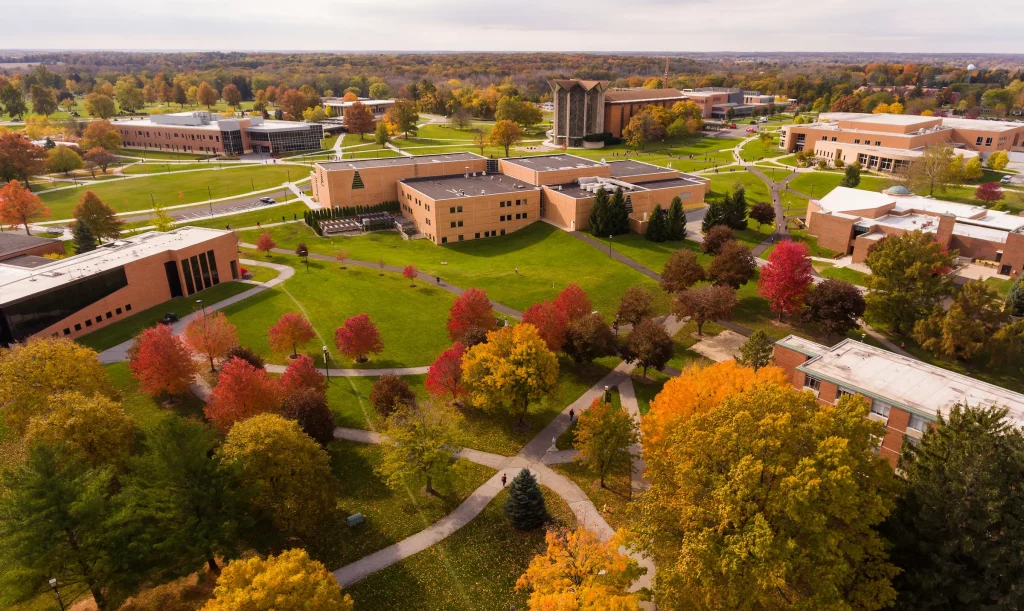Lowering Barriers, Creating Opportunities
Valparaiso University’s strategic plan pushes for an emphasis on learning and leading, and the College of Engineering is living those goals through providing students with unique opportunities to explore their passions and make real change in the world through undergraduate research. As part of this dedication to research, the College of Engineering is leading a multi-school initiative to revolutionize how students and professors connect to pursue undergraduate research projects called Research 4 All.
“The idea is to recognize that students are stakeholders in the research process and to empower students in making research choices,” says project leader Professor Reva Johnson. “They don’t feel like they need to just take whatever is available. They see all the research opportunities available to them, and they can indicate which are the most interesting to them
According to Professor Johnson, simple awareness of projects and qualified students is one of the biggest obstacles standing between brilliant students and professors with projects that could utilize their skills.
“My colleagues and I have been trying to share available research opportunities with students, and we’ve increased research participation, but we are still lacking a system, and selecting research students is a pretty ad-hoc process,” Professor Johnson says.
 Research 4 All will lower barriers like awareness and give more students the opportunity to make a real-world impact through its three segments — titled URCurious, URSkilled, and URConnected.
Research 4 All will lower barriers like awareness and give more students the opportunity to make a real-world impact through its three segments — titled URCurious, URSkilled, and URConnected.
URCurious will give every student a taste of what it’s like to work on a real-world problem during the course of their time at Valpo by integrating research into the existing engineering curriculum. This offers students a risk-free opportunity to explore alternative interests, gain valuable skills, and contribute to the engineering world in meaningful ways over the course of their required courses.
For professors, knowing which students have which skills can be an issue when finding research assistants, and students are lacking an avenue to advertise what skills they have. URSkilled is focused on addressing this issue. Student and research mentors will be able to participate in online training modules where they can earn “badges” in specific skills. These badges will represent their qualifications to assist in relevant research topics, and they can be earned on the student’s own time or at the direction of a professor.
With this system in place, URSkilled also tackles the issue of research assistant turnover due to graduation, by allowing professors to bring students up to speed and get them qualified for the job earlier in their college careers than they would be otherwise.
However, simply having a database of badges is meaningless without a system in place for professors and students to use them. Valparaiso University’s College of Engineering has taken charge of the URConnected portion of the project, creating an online application for forging the connections between researchers and their ideal student assistants through the system implemented in URSkilled.
“If I were a professor in need of a student with an understanding of heat transfer, I could look for students with that demonstrated capability,” says Dan Maguire, Ph.D., assistant professor of electrical and computer engineering. “If a student wanted to work on a project that involved heat transfer, they could establish their skill — or increase their understanding — in that area using the complementary mechanism.”
Doug Tougaw ’05 MBA, Ph.D., P.E., dean of the College of Engineering, says that Valpo’s size and approach towards student research make the University especially qualified to take on the challenges of URConnected.
“Having the infrastructure to support undergraduate research projects is something that we can really do better than some bigger schools,” Dean Tougaw says. “These goals represent the core values of Valpo. We want to make the connections necessary to help our students succeed, and we want to make sure our students are well prepared to succeed on day one.”
Connecting students and professors through this program will also lower the emotional barrier that often prevents students from participating in research projects.
“This process will be designed to be much less intimidating to students when compared with the current process, which typically involves students walking into a faculty member’s office and asking if they have any research opportunities,” Professor Johnson says.
Research 4 All has been made possible by $2 million in support from the Kern Family Foundation, the founders of the Kern Entrepreneurial Engineering Network (KEEN), a partnership of over 50 colleges from across the United States focused on fostering an entrepreneurial mindset in undergraduate engineering students. The initiative is planned to be developed over a three-year period, by the end of which all involved institutions will implement the tools and techniques developed by the three goals.
Other institutions taking part in Research 4 All include: George Washington University, George Fox University, North Carolina Agricultural and Technical State University, Olin College of Engineering, University of Washington-Tacoma, The University of North Carolina-Chapel Hill, and Campbell University.
